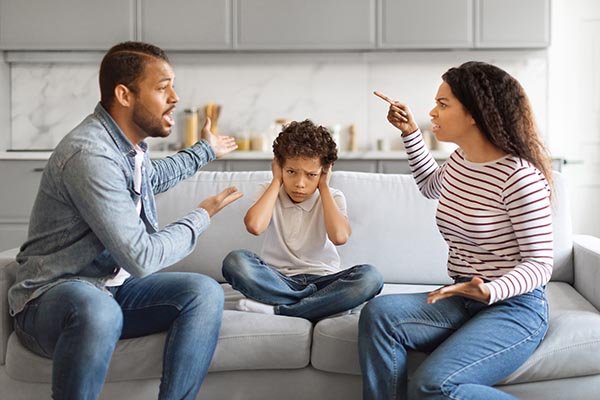The Impact of Parents Fighting and Triangulating Their Children
Conflict is a natural part of any relationship, but when parents fight and bring their children into the middle of it, the emotional consequences can be deep and long-lasting. Many parents don’t realize the impact their arguments have on their children until they step back and see how their kids are reacting—becoming anxious, acting out, or taking on roles that don’t belong to them. If you and your partner recognize that you’ve been triangulating your children in your conflicts, you are not alone, and there is a way forward.
What is Triangulation?
Triangulation happens when parents involve their children in their disputes, either by using them as messengers, allies, or emotional support systems. This can look like:
Asking your child to relay messages to the other parent instead of communicating directly.
Venting to your child about the other parent.
Encouraging (directly or indirectly) your child to take sides.
Blaming your child for problems in the relationship.
While often unintentional, triangulation places an unfair burden on children. It forces them into adult situations they are not equipped to handle and can lead to feelings of confusion, anxiety, and divided loyalty. Over time, this can impact their self-esteem, relationships, and emotional regulation.
How Conflict Between Parents Affects Children
When children witness frequent or intense parental conflict, especially when they feel caught in the middle, it can lead to:
Increased anxiety and depression
Problems with emotional regulation
Difficulty forming healthy relationships in the future
A sense of responsibility for their parents’ problems
Behavioral issues, including acting out or withdrawing
Children should never feel like they have to fix their parents' relationship or manage their emotions. The good news is that if you recognize these patterns, you can take steps to create a healthier environment for your children.
What to Do Instead
If you and your partner have identified that you’ve involved your children in your conflicts, the first step is to commit to a healthier approach. Here are some steps to take:
Keep adult issues between adults. Avoid discussing disagreements in front of your children.
Communicate directly. If you need to talk about parenting or relationship concerns, do so with your partner, not through your child.
Provide a unified front. Even if you disagree, present a cooperative attitude when discussing family matters with your children.
Apologize and validate your child’s experience. If your child has been impacted, acknowledge it and reassure them that it’s not their responsibility to manage your relationship.
Sample Scripts to Use with Your Child
If your child has been caught in the middle, it’s important to repair and reassure them. Here are some scripts to guide these conversations:
1. Acknowledging past triangulation:
“We realize that we’ve put you in the middle of some of our disagreements, and that’s not fair to you. You should never feel like you have to take sides or be responsible for our problems. We are going to work on handling things differently, and we want you to know that we love you and that this is not your fault.”
2. Reassuring them of their role as a child:
“Your job is to be a kid, not to worry about grown-up things. If we ever make you feel like you have to fix our problems, please let us know. We are working on making sure that doesn’t happen anymore.”
3. Addressing a past argument they witnessed:
“You heard us arguing the other day, and we’re sorry about that. We should have handled that differently. We want you to know that even when we disagree, we are still working together as parents to take care of you.”
4. Encouraging open communication:
“If you ever feel caught in the middle or don’t know what to do, you can always talk to us. We want you to feel safe and supported, no matter what.”
Working Together as Parents
If you and your partner struggle with conflict, consider seeking professional support. A trained therapist can help you learn healthier communication strategies and prevent ongoing harm to your children. Breaking the cycle of triangulation is one of the greatest gifts you can give your children—a home where they feel safe, loved, and free from the burden of adult conflicts.
If you want to learn more about improving communication and creating a healthier family environment, schedule a session with one of our therapists today. You don’t have to navigate this alone—we are here to help.

